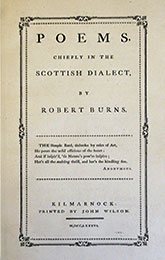Poems, Chiefly in the Scottish Dialect
Critique • Quotes
 Title page, 1786 Kilmarnock edition
Title page, 1786 Kilmarnock editionAlso known as
The Kilmarnock volume
First publication
1786
Literature form
Poems
Writing language
Scots dialect
Author's country
Scotland
Length
36 poems
Poems for a lifetime of reading
I won't stick to the poems in Burns's first published collection, nor to the works in the enlarged edition that came out the next year. Most modern Burns collections include poems and songs from throughout his life. You're unlikely to pick up an exact copy of Poems, Chiefly in the Scottish Dialect anywhere. So I'll just refer to some of the poems Burns wrote early in his short career, regardless of when they were officially published.
Whatever edition you get however, make sure it has footnotes or a glossary explaining various terms of Scottish dialect. Burns wrote in the Scottish dialect of English, so it's very close to the English vernacular. Don't let the slightly strange words discourage you from reading Burns. Some of them are easy to guess from the context: a' as in for a' that means "all", vera means "very", ane is "one", guid is "good". Others you'll need to look up the first time: bairns are children, a doxy is a lover, unco means "strange". But after a while the most common expressions become familiar. Really. Get deep enough into Burns and you'll find yourself bewildering your friends by throwing the words into everyday speech.
The first Burns poems that captured the public imagination was "The Cotter's Saturday Night", a cotter being an agricultural worker who lives in a small rural dwelling (like a cottage). In a mixture of Scottish dialect and English, the poem depicts the events in the cotter's family one evening. It is somewhat idealized and sentimental, presenting the example of the simple, virtuous folks as representative of what is great about Scotland.
Also popular then was "To a Mouse", subtitled "On ploughing her up in her nest with the plough, November 1785". From this poem we get the famous lines "The best laid schemes of mice an' men / Gang aft agley" (which are often rendered as "the best laid plans of mice and men often go askew") as Burns compares the mouse's distress with his own cruel failures.
Similar is the poem "To a Mountain Daisy" about a flower (and a certain poet) crushed by fate. Cute. But not much to say to me (crushed poet though I be), nor to anyone else besides the extremely self-pitying, in my view.
"Man Was Made to Mourn" is a more deeply felt, non-humorous bewailing of fate, as expressed in the oft-quoted lines "Man's inhumanity to man / Makes countless thousands mourn!"
Singing their stories
My favourite of Burns's early period though is the long poem "Love and Liberty", better known now as "The Jolly Beggars". It was actually written to be sung by several voices and for some reason was kept out of the Edinburgh edition of Poems, appearing again after the poet's death. The first verses are difficult to get through as Burns sets the stage in heavy dialect with a description of the furious weather outdoors and the ragamuffin characters carousing in the pub. Then they each take turns singing their stories. A once-proud soldier tells of how he has been reduced by war injuries to begging "with a wooden arm and leg, and many a tattered rag, hanging over my bum" (no translation necessary here), yet he could still "meet a troop of Hell at the sound of a drum". The soldier's doxy relates her fall from virtue. Others follow, each reciting a tale of love or freedom taken away but finding some relief in companionship or drink. A highlight is their defiant singing in chorus: A fig for those by law protected! Liberty's a glorious feast....
Similarly scathing but in a subtle, satirical vein is "Holy Willie's Prayer". A church elder prays piously but unconsciously reveals his selfish hypocrisy. The poem was left out of the Kilmarnock edition of Poems for fear of giving offence. Burns or his publisher were braver however with "The Holy Fair", another satire on religion, in which the natural earthy spirits of the young folks in church contrast with the exhortations of the hypocritical ministers and elders threatening damnation.
"Address to the Deil" (Devil) starts with the memorable lines "O Thou! Whatever title suit thee— / Auld Hornie, Satan, Nick, or Clootie" and goes on to make fun of Scottish ideas of the devil and other superstitions.
I could pick a hundred other poems or songs from Burns's oeuvre to talk about. Get a thick volume of his works and read enough to master the dialect, and then spend the rest of your life dipping into it to uncover new gems.
— Eric
Critique • Quotes

